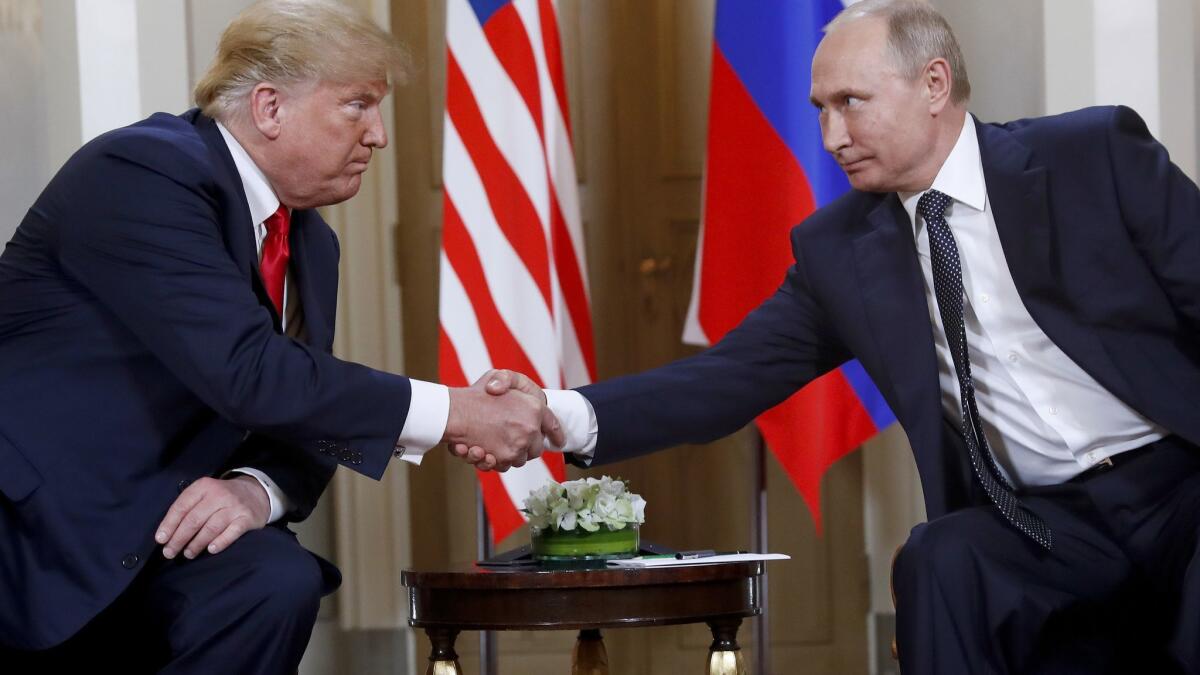Column: Early on, Trump-Russia obsessives were marginalized; they’re prophets now

“I felt like the guy in ‘Rear Window,’ ” David Corn, the coauthor of “Russian Roulette,” told me this week.
Corn was referring to his affinity for James Stewart’s character, L.B. “Jeff” Jefferies, in Alfred Hitchcock’s masterpiece film. Jeff witnesses a crime across the courtyard from his New York City apartment. But when he talks about it no one believes him.
Corn, likewise, had a period in 2016 when he saw a massive global crime going on right outside his window. The Kremlin was waging war on America. And that November, it captured the White House. But for an agonizingly long time, as the media critic Liz Spayd put it at the time, “the majority view [was] that there wasn’t enough proof of a link between Trump and the Kremlin to write a hard-hitting story” during the campaign.
This majority view persisted even after the election.
At the end of 2016, a BBC radio reporter asked me — I’m not kidding — whether a Putin puppet had taken the White House because Hillary Clinton wasn’t sexy enough.
Or because she hadn’t campaigned in Wisconsin?
No! I wanted to shout. Clinton “lost” because she had failed to campaign in the Urals!
In 2017, we had front-page reporting on partisanship, palace intrigue and cultural battles. Could Ivanka Trump and Jared Kushner be moderating presences in the White House? Did American neo-Nazis and believers in the Pizzagate conspiracy have legitimate grievances?
The most insulting and consequential national security breach in all of American history was being downplayed in favor of sports reporting.
And even when the media paid attention to the appointment of special counsel Robert S. Mueller III in May 2017, or the testimony by fired FBI Director James B. Comey in June, or the plea deal of former national security advisor Michael Flynn in December, they often framed the news as more evidence of partisanship.
Was Comey a secret Democrat? How about Peter Stzrok, who was fired from the Mueller investigation? Was he not just a Democrat — but an adulterer?
The most insulting and consequential national security breach in all of American history was being downplayed in favor of sports reporting: the red team versus the blue team.
Perhaps in those days the story of Trump-Russia was too terrifying for media organizations determined to keep their professional cool. Or too far-fetched.
Corn says he felt “lonely,” even as his stories about about the Russia affair gained traction. Others who reported early about curious Trump connections in Moscow — Franklin Foer in Slate, for example — have said the same thing.
But they’re not lonely now. And this is mostly because even while some media organizations sidelined, or cautiously framed, the Trump-Russia story, a much more important group of commenters were far less timid. Let’s give a round of retweets for the concerned citizens of the United States.
Take one look at Twitter: swelling numbers — initially thousands, then tens and perhaps even hundreds of thousands — gather now to raise their voices to undo Trump’s constant gaslighting about the Mueller investigation, which is decidedly not a witch hunt.
From all quarters, these citizens have kept the Trump-Russia story front and center for the electorate, and provided analysis and even scoops that clarify and help to remedy the global catastrophe that is Trump’s presidency.
Among the most effective are Marc Murphy (@mnnurse10 ), who retweets articles about the corruption of the president and Mueller’s heroism, and Karen Schwartz (@pithywidow), a novelist and single mother in New York state who studies the indictments coming out of the Russia investigation as if they were the Talmud. She is a genius at details and prophecy.
Far-flung celebrities also have joined in, from soap-opera delight Morgan Fairchild to Shakespearean heartthrob Rufus Sewell.
The Twitter chorus initially used #resistance to corral their posts, and later a set of beloved Trump-Russia memes (including Don Jr.’s down-to-collude beaut in response to proffered Hillary dirt: “If it’s what you say, I love it”).
Enter the Fray: First takes on the news of the minute »
Many with marquee platforms once derided these people for their obsession, calling them Russophobes, crackpots and worse. But those critics are much, much quieter now, as the tweets that once seemed gonzo have been borne out in indictments, sentencing documents, plea deals and white-shoe investigative journalism.
Trump-Russia is a blind-men-and-the-elephant story. We need people at the trunk, the tail and everywhere in between telling us what they perceive so we can get the full picture.
But back to “Rear Window.”
Jeff is thought delusional when he insists he sees a neighbor in a raincoat committing foul play. “Why would a man leave his house three times on a rainy night with a suitcase?” he asks.
His girlfriend looks bored.
“What’s interesting about a butcher knife and a small saw wrapped in newspaper? Huh?!” he huffs. He’s right, just as you’d have to be a fool to find uninteresting a Trump Tower meet and greet between “Make America Great Again” campaigners and Russian shady characters. Or a disquieting set of pings to a Trump server from a Russian bank.
“There’s something terribly wrong!” Jeff shouts.
Today, finally, that’s the majority view.
Twitter: @page88
More to Read
A cure for the common opinion
Get thought-provoking perspectives with our weekly newsletter.
You may occasionally receive promotional content from the Los Angeles Times.










